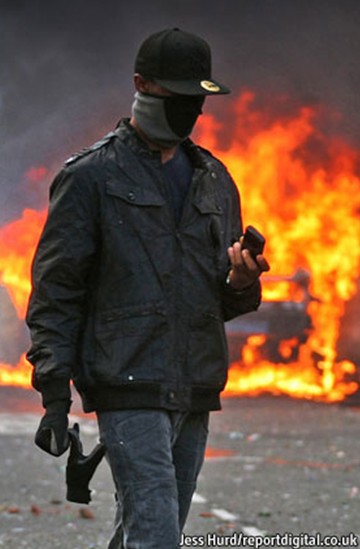发布时间: 2016年09月26日

『暴乱者使用黑莓手机对付警方,警方能以其人之道,还治其人之身吗?』
Technology and disorder: The BlackBerry riots
科技与暴乱:黑莓手机助长英国暴乱
Aug 13, 2011 | From The Economist

AS BRITONS ask themselves what has changed in their country that might have caused these riots, one obvious answer stands out: technology. The digital revolution allows people to organise against the authorities—not just in the Middle East, but also in Britain.
The communications tool of choice for rioters has been the BlackBerry. It has 37% of the teenage mobile market. Young people like its BlackBerry Messenger (BBM) feature, which allows users to send free messages to individuals, or to all their contacts at once. It was used to summon mobs to particular venues. David Lammy, the MP for Tottenham, has called for BBM to be suspended.
The rioters use BBM against the police. But can the police use it against the rioters? Research in Motion (RIM), the firm behind the BlackBerry, and the mobile operators hold at least one, and probably two, sorts of useful information. The first is traffic data: who messaged whom, when and from where. Used in conjunction with CCTV pictures, that could well help police put names to faces—though if many of the rioters were using pay-as-you-go phones, it will prove less useful, as it is harder to track their owners down.
Security experts say it is pretty clear that the law empowers police to demand that phone companies hand over traffic information. The Data Protection Act, which normally prevents companies from sharing such information, has a get-out clause for cases where it is clear that a crime has been committed. The legal position is less clear when it comes to the actual content of messages.
BlackBerry messages are widely thought to be tightly encrypted. But that is the case only for BlackBerrys tied to corporate networks. The security on BlackBerrys sold to individuals is no tighter than for normal phones, according to Richard Clayton of the University of Cambridge; and copies of the messages sent on them should still exist.
Handing content over could, however, cause problems for RIM and the phone companies. Revealing such information to the police could be bad for business; they might be sued for breach of confidentiality. The police could issue warrants, but it is not clear whether they have the power to intercept phone messages en masse.
But the biggest problem, says Ross Anderson, also of Cambridge university, is that police computer forensics departments are chronically under-resourced. “All they can do is kiddie porn, terrorism and murder. They don’t even bother with bank fraud,” he says. “There’ll be petabytes of traffic data and CCTV data. They won’t be able to cope. If you want the surveillance society to become a reality, you’re going to have to increase budgets by an order of magnitude.”
热门推荐:
下一篇: 考研阅读精选:解读减肥难题的新模式
历年考研真题下载